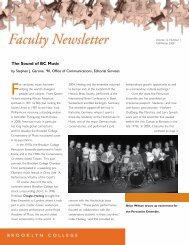Summer And Fall 2012 Registration Letter - Brooklyn College - CUNY
Summer And Fall 2012 Registration Letter - Brooklyn College - CUNY
Summer And Fall 2012 Registration Letter - Brooklyn College - CUNY
Create successful ePaper yourself
Turn your PDF publications into a flip-book with our unique Google optimized e-Paper software.
<strong>Summer</strong> <strong>2012</strong> and <strong>Fall</strong> <strong>2012</strong> <strong>Registration</strong> Information<br />
<strong>Registration</strong> for the <strong>Summer</strong> <strong>2012</strong> semester begins Tuesday, April 17, <strong>2012</strong>. <strong>Registration</strong> for the <strong>Fall</strong><br />
<strong>2012</strong> semester begins on Tuesday, May 1, <strong>2012</strong>. In order to ensure that you get a seat in a class, it is<br />
extremely important that you register as soon as possible. This applies to both undergraduate and<br />
graduate students. If you wait, you may find that the classes you want have been closed or cancelled<br />
due to low enrollment. Graduating seniors are being given the first opportunity to register – take<br />
advantage of that opportunity!<br />
Classes offered during the summer are very intense, however with dedication; the motivated student<br />
has an opportunity to accumulate credits in a very short time.<br />
It is highly recommended that majors see a Deputy Chair each semester to plan out their schedule for<br />
the next semester.<br />
You may meet with the advisors during their office hours or make an appointment via email.<br />
Undergraduate CLAS Deputy Chair – Professor Moshe Augenstein –<br />
augenstein@sci.brooklyn.cuny.edu<br />
Undergraduate SGS Deputy Chair – Professor Joseph Thurm – jthurm@juno.com<br />
Acting Graduate Deputy Chair – Professor Paula Whitlock – whitlock@sci.brooklyn.cuny.edu<br />
Director of BS in Information Systems – Professor Ira Rudowsky –<br />
rudowsky@brooklyn.cuny.edu<br />
Director of BS in Multimedia Computing ‐ Professor Elizabeth Sklar –<br />
sklar@sci,brooklyn.cuny.edu<br />
1. The registration system at <strong>Brooklyn</strong> <strong>College</strong> enforces prerequisites. If you feel a prerequisite<br />
should be waived, please see a registration advisor or one of the Deputy Chairs or the instructor<br />
of the course before you register. The prerequisite of CISC 1050 that applies to several courses<br />
is readily waived if you know computer application tools such as Word, Excel, Access and/or<br />
PowerPoint. Also, if your courses from another school have not yet been evaluated and posted<br />
to your transcript, please make sure to come to the department office as early as possible for<br />
advisement and possible waiver of prerequisites. If a course is closed and you need an overtally,<br />
please speak to the instructor of the course and obtain written permission. If the instructor<br />
agrees, bring the note to the CIS Department Office (2109N). One of the secretaries will enter<br />
the overtally into the computer. You may then register for the course. NOTE: YOU ARE NOT<br />
GUARANTEED THAT AN OVERTALLY WILL BE GIVEN. There are several courses which cannot<br />
support additional students due to the limited amount of equipment available. Plan ahead and<br />
register early!<br />
2. Note that you must earn a C or higher in all CIS prerequisites to any CIS course. If you earn a C‐<br />
or below in a prerequisite course, you should take the course over before going on to the next<br />
course. (However, if you earn below a C in a Math prerequisite for a CIS course, you may still<br />
register for the next CIS course, although the Math department may require a minimum grade<br />
for registration in a subsequent Math course.) Note also that the C requirement applies only to<br />
a prerequisite and to the 24 credits of advanced electives that must be taken at <strong>Brooklyn</strong><br />
<strong>College</strong>. Thus, for example, you need not repeat CISC 3220 (CIS 23) if you earn less than a C<br />
since CISC 3220 (CIS 23) is not a prerequisite for another CIS course. Similarly, you need not
epeat CISC 3320 (CIS 25) if you earn less than a C unless you want to take CISC 4330 (CIS 46.5),<br />
for which CISC 3320 (CIS 25) is a prerequisite.) Transfer students should be especially careful<br />
that they present 24 credits of advanced electives in the major (courses numbered CISC 2000<br />
(CISC 10) or higher) taken at <strong>Brooklyn</strong> <strong>College</strong> with a grade of C or better.<br />
Note that the Math department allows CIS students who received a D in MATH 1206 (Math 4.3)<br />
to register for MATH 2501 (Math 8.1), but will not allow a student who received below C‐ in<br />
MATH 1201 (Math 3.3) to register for MATH 1206 (Math 4.3).<br />
3. Undergraduate courses being offered in the <strong>Summer</strong> include: CORC 1312, CORC 3303, CORC<br />
3310, CISC 1050, CISC 1110, CISC 1530, CISC 1580W, CISC 1590, CISC 1600, CUSC 2210, CISC<br />
2531, CISC 2820W, CISC 3130, and CISC 3410.<br />
4. A Graduate course being offered in the <strong>Summer</strong> is: CISC 7522.<br />
5. Undergraduate advanced electives being offered in the <strong>Fall</strong> include: CISC 2210 (CIS 11), CISC<br />
2531 (CIS 10.31), CISC 2810 (CISC 10.33), CISC 2820W (CIS 12W), CISC 3110 (CIS 15), CISC 3120<br />
(CIS 20.1), CISC 3130 (CIS 22), CISC 3140 (CIS 20.2), CISC 3150 (CIS 26), CISC 3160 (CIS 24), CISC<br />
3220 (CIS 23), CISC 3230 (CIS 38), CISC 3310 (CIS 27.1), CISC 3320 (CIS 25), CISC 3345 (CIS 49.2),<br />
CISC 3410 (CIS 32), CISC 3630 (CIS 52), CISC 3630 (CIS 52), CISC 3660 (CIS 54.1), CISC 4900 (CIS<br />
60.1), CISC 4905 (CIS 60.2), and CISC 5001‐CISC 5003 (CIS 88.1‐CIS 88.3).<br />
6. Graduate courses being offered in the <strong>Fall</strong> include: CISC 7100 (CIS 701), CISC 7110 (CIS 707), CISC<br />
7200 (CIS 714), CISC 7310 (CIS 704), CISC 7312 (CIS 705), CISC 7332(CIS 748), CISC 7342 (CIS<br />
744.1), CISC 7350 (CIS 746), CISC 7422 (CIS 712), CISC 7500 (CIS 757), CISC 7510 (CIS 717.1), CISC<br />
7540 (CIS 763), CISC 7900 (CIS 790) and CISC 7902 (CIS 791).<br />
7. Flowcharts for the majors as well as our Advice to Undergraduates and Graduate brochures are<br />
available online at http://www.brooklyn.cuny.edu/pub/departments/cis/cis_forstudents.htm<br />
8. Students in CORC 1312 (CC 3.12) or CORC 3303 (CC 30.03), or CISC 1050 (CIS 5.2) or CISC 1590<br />
(CIS 9.2) or CISC 2531 (CIS 10.31) or CISC 2820W (CIS 12W), who have not taken CISC 1110 (CIS<br />
1.5) and wish to major or minor in CIS should register for CISC 1110 (CIS 1.5), which teaches<br />
programming in C++. Most advanced CIS courses present their concepts using the C++<br />
programming language. If you have had a programming course in a language other than C++<br />
and do not know C++, please see the Chairperson.<br />
9. Students who have taken CORC 1312 (CC 3.12) or CORC 3303 (CC 30.03), or CISC 1000 (CIS 1.0)<br />
or CISC 1110 (CIS 1.5) or CISC 1030 (CIS 3) or CISC 1035 (CIS 3.1) or CISC 1530 (CIS 3.2) or CISC<br />
1050 (CIS 5.2) or CISC 1590 (CIS 9.2) or CISC 2531 (CIS 10.31) or CISC 2820W (CIS 12W), who do<br />
not wish to major in CIS and:<br />
who want proficiency in current application tools should register for CISC 1050 (CIS 5.2).<br />
who are interested in business applications of the Internet should register for CISC 1530<br />
(CIS 3.2).<br />
who want to learn about multimedia computing should register for CISC 1600 (CIS 3.5).
who are interested in how information systems operate in organizations should register<br />
for CISC 1590 (CIS 9.2).<br />
who are interested in media and business should register for CISC 1597 (CIS 9.7).<br />
who are interested in business applications of computing should register for CISC 2531<br />
(CIS 10.31).<br />
who are interested in the dangers and ethics of computing should register for CISC<br />
2820W (CIS 12W).<br />
10. If you plan on majoring or minoring in CIS, it is recommended that you take CISC 3110 (CIS 15)<br />
immediately after CISC 1110 (CIS 1.5). Students in CISC 1110 (CIS 1.5) can also register for either<br />
CISC 2210 (CIS 11) (assuming you have taken MATH 1011 (Math 2.9) or have placed in MATH<br />
1201 (Math 3.3), or CISC 2820W) (CIS 12W (assuming you have taken ENGL 1012 (English 2)).<br />
11. CISC 3110 (CIS 15) is required for the major. CISC 3110 (CIS 15) teaches advanced programming<br />
in C++ and is the standard second course in CIS at BC. You may also want to take CISC 2210 (CIS<br />
11 ) together with CISC 3110 (CIS 15) in order to make rapid progress in the major. Another<br />
course you can take together with CISC 3110 (CIS 15) is CISC 2820W (CIS 12W).<br />
12. Students currently in CISC 3110 (CIS 15) should register for CISC 3130 (CIS 22). It is important to<br />
take CISC 3130 (CIS 22) as soon as possible after CISC 3310 (CIS 15) for two reasons: first, you<br />
want your knowledge of C++ to be as fresh and thorough as possible when you take CISC 3130<br />
(CIS 22), and, second, most other CIS courses have CISC 3130 (CIS 22) as a prerequisite, so taking<br />
CISC 3130 (CIS 22) enables you to take a wide variety of other courses in the future. You may<br />
also wish to take CISC 3310 (CIS 27.1) along with CISC 3130 (CIS 22) if you have taken CISC 2210<br />
(CIS 11).<br />
13. Students currently in CISC 2210 (CIS 11) should take CISC 3310 (CIS 27.1). Students who have<br />
already passed CISC 2210 (CIS 11), CISC 3110 (CIS 15) and CISC 3130 (CIS 22), all with a C or<br />
above, should take CISC 3310 (CIS 20.1), CISC 3310 (CIS 27.1) and/or CISC 3220 (CIS 23) or CISC<br />
3230 (CIS 38). If you’ve taken CISC 3310 (CIS 20.1), take CISC 3140 (CIS 20.2) and/or CISC 3150<br />
(CIS 26).<br />
14. CISC 2210 (CIS 11) is required for the major and introduces important mathematics frequently<br />
used in computer science. The prerequisite for CISC 2210 (CIS 11) (Discrete Structures) includes<br />
MATH 1011 (Math 2.9) or assignment to MATH 1201 (Math 3.3) on the basis of the <strong>Brooklyn</strong><br />
<strong>College</strong> Mathematics Placement Test. It also requires either CISC 1110 (CIS 1.5) or CISC 1180<br />
(CIS 2.80).<br />
15. CISC 1050 (CIS 5.2), Microcomputers in Business and Administration, teaches the use of word<br />
processing (Microsoft Word), spreadsheets (Excel), databases (Access), and presentation<br />
software (PowerPoint) on personal computers. There is no prerequisite for CISC 1050 (CIS 5.2).<br />
This elective course may be of interest to all CIS students. It is a prerequisite for CISC 3800 (CIS<br />
13.2) and for CISC 3810 (CIS 45). (However, CISC 1050 (CIS 5.2)) is often waived if you know<br />
computer application tools such as Word, Excel, Access and/or PowerPoint.)
16. CISC 1530 (CIS 3.2) Electronic Commerce is being given in conjunction with the Business<br />
Program of the Economics Department. It is a survey of practices in doing business online over<br />
the Web. The prerequisite is either CORC 1312 (CC 3.12) or Core 5.1 or CISC 1000 (CIS 1.0) or<br />
CISC 1110 (CIS 1.5). It is open to CIS majors and non‐majors.<br />
17. CISC 1600 (CIS 3.5) Introduction to Multimedia Computing is a course for majors or non‐majors.<br />
It has no prerequisites.<br />
18. Students in CISC 3130 (CIS 22) should register for CISC 3120 (CIS 20.1). This course will cover<br />
how to develop application software. Courses that can be taken with CISC 3120 (CIS 20.1) if<br />
you’ve completed CISC 3130 (CIS 22) are CISC 2210 (CIS 11), ( CISC 3220 (CIS 23) or CISC 3230<br />
(CIS 38) (if you’ve also taken CISC 2210 (CIS 11) and MATH 1201 (Math 3.3), and CISC 3310 (CIS<br />
27.1) (if you’ve already taken CISC 2210 (CIS 11). Students who have taken CISC 3120 (CIS 20.1)<br />
should take CISC 3140 (CIS 20.2) and then CISC 3150 (CIS 26). CISC 3140 (CIS 20.2) and CISC<br />
3150 (CIS 26) are both required for the CIS major.<br />
19. All undergraduate students who entered or re‐entered <strong>Brooklyn</strong> <strong>College</strong> in <strong>Fall</strong> 2001 or later are<br />
required to take a writing‐intensive course (indicated with a W after the number). In CIS, you<br />
should register for CISC 2820W (CIS 12W), Computers and Ethics. CISC 2820W (CIS 12W) is<br />
required for the CIS major. ENGL 1012 (English 2) is a prerequisite for all W courses.<br />
20. CISC 4900 (CIS 60.1) or CISC 5001 (CIS 88.1) is required of all CIS majors. They both require<br />
department permission for registration. CISC 4900 (CIS 60.1) requires completion of a major<br />
computer science project (involving approximately 15 hours/week of work), plus tutoring.<br />
Students may find their own project, within or outside the school. Many students use projects<br />
at work for their CISC 4900 (CIS 60.1) project.<br />
Students generally do not take CISC 4900 (CIS 60.1) before their senior year, but students who<br />
present an appropriate project may be given permission before then. Students who are unable<br />
to find a project and are seniors will be assigned a project and must arrange their schedule so<br />
that they have two complete days a week available for project‐related activities.<br />
Students who wish to receive permission to register for CISC 4900 (CIS 60.1) should see<br />
Professor Augenstein, (Room 2122N, x5204, email: augenstein@sci.brooklyn.cuny.edu), or<br />
leave a message for him in the department office (Room 2109N, x5657). Students who have<br />
already taken CISC 4900 (CIS 60.1) may take CISC 4905 (CIS 60.2) to continue their project or do<br />
an additional project.<br />
21. CISC 5001‐CISC 5003 (CIS 88.1‐CIS 88.3) are honors courses that are only open to superior CIS<br />
majors. It involves doing a research project under the supervision of a senior faculty member.<br />
Students need permission from the faculty member and from the Chair of the Department.<br />
Prior to obtaining permission from the Chair a written proposal, in consultation with the<br />
sponsoring faculty member, must be submitted to and approved by the Honor Course<br />
Committee. Faculty members who have sponsored CISC 5001 (CIS 88.1) projects in the past are<br />
Profs. Bar‐Noy, Dexter, Kopec, Langsam, Parsons, Raphan, Sklar, Sokol, Tenenbaum, Weiss, and<br />
Whitlock.
22. A number of courses are offered jointly with other departments. Although most are not required<br />
for the CIS major, majors may gain a lot of useful knowledge and skills from these courses. Some of<br />
these are required for the Information Systems major.<br />
o CISC 1530 (CIS 3.2) (Electronic Commerce, also BUSN 3120 (BUS 31.5)).<br />
o CISC 1580W (CIS 8.3W) (Computer Management Games, also BUSN 4202W (BUS 80.3W))<br />
o CISC 1590 (CIS 9.2) (Management Information Systems, also BUSN 3420 (BUS 31.3)) is a<br />
course that surveys how computers are used in large organizations for organizing and<br />
retrieving information.<br />
o CISC 1597 (CIS 9.7) (Media and Business, also BUSN 3110 (BUS 31.7) and TVRA 3537 (TVR<br />
31.7)) is a course that surveys new media such as the Web and how it is used in Business<br />
applications.<br />
o CISC 2531 (CIS 10.31) (Operations Management, also BUSN 3430 (BUS 31.4) is offered<br />
jointly with the Business Program. It teaches how to manage the operations of a company<br />
using computers. Students who want to go into commercial computing will find this course<br />
very useful.<br />
o CISC 2810 (CIS 10.22) (Macromolecular Structures and Bioinformatics) is offered jointly<br />
with the Biology Department, is a course that introduces the fundamentals of biological<br />
macromolecular structures and the computational tools important in determining<br />
biological functions.<br />
o CISC 2820W (CIS 12W) (Computers and Ethics, also PHIL 3318W (PHIL 14.4W)).<br />
23. During the <strong>Summer</strong> <strong>2012</strong> semester we are offering CISC 3410 (CIS 32) (Artificial Intelligence). Topics<br />
covered are taken from the areas of problem solving, perception, game playing, knowledge<br />
representation, natural language understanding, programs that learn (adaptive programs), expert<br />
systems, and programming languages for work in artificial intelligence. This is an excellent advanced<br />
elective to take during the summer and serves to fulfill a major requirement.<br />
24. The CIS Department offers a Minor in Multimedia Computing, for which computer science (and<br />
other) majors are eligible. The minor requires:<br />
a. All of the following: Computer and Information Science 1110 or 1180; 1600, 3110 and 3120<br />
and 3130; and 3620 and or 3630.<br />
b. Two of the following: Computer and Information Science 3610, 3415, 3635, 4610, 49.3,<br />
3645, 3640, 3650, 3660, 3665, 3610, 3620, 3630, 3650, 3660, 3665, 4610.<br />
Courses presented for the majors in Computer Science or Information Systems may also be used to<br />
satisfy the minor in Multimedia Computing. You can have a major in computer science with a minor<br />
in multimedia computing if you satisfy the major requirements and take the above courses.<br />
Courses presented for the major in computer and information science may also be used to satisfy<br />
the minor in multimedia computing.<br />
25. The CIS Department offers a Minor in Cognitive Science together with the Departments of<br />
Philosophy and Psychology. The minor consists of CISC 1110 (CIS 1.5), PHIL 3422 (Philosophy 5),
PSYC 1000 (Psychology 1.1), PSYC 3530 (Psychology 57.1), and a choice of one course from each of<br />
the following groups: Group A: PHIL 3123 (Philosophy 12.3), PHIL 3410 (Philosophy 26), PHIL 3401<br />
(Philosophy 27), PHIL 3420 (Philosophy 28) or PHIL 3601 (Philosophy 42). Group B: CISC 3410 (CIS<br />
32) or CISC 1410 (CIS 10), PHIL 3423 (Philosophy 29), PSYC 3580 (Psychology 57.2). The minor can<br />
be taken together with the CIS major and deals with the issue of “What is cognition and how can it<br />
be created artificially?”<br />
26. The CIS Department offers a Minor in Parallel and Distributed Computing. This is a valuable minor<br />
for science majors or those who wish to program multi‐core computers. The minor consists of CISC<br />
1110 (CIS 1.5) or CISC 1180 (CIS 2.80), CISC 1150 (CIS 2.50), CISC 3110 (CIS 15), CISC 3130 (CIS 22),<br />
CISC 3350 (CIS 46), CISC 4330 (CIS 46.5), CIS 47 (CISC 3330), CIS 55 (CISC 4335).<br />
27. Advanced (senior year) students with good records can also consider taking a graduate course<br />
offered by the department, as an advanced elective, if they satisfy the prerequisite conditions. This<br />
requires the approval of both the department and the Academic Advisement Center. For<br />
information, contact Professor Simon Parsons – parsons@sci.brooklyn.cuny.edu<br />
28. Urge your non‐major friends who have not taken CIS classes to take CORC 1312 (CC 3.12), the core<br />
computing course. Also, both majors and non‐majors can take CORC 3303 (CC 30.03), Exploring<br />
Robotics, or CORC 3310 (CIS 30.10), Paradoxes and the Limits of Knowledge to satisfy an upper‐tier<br />
Core Curriculum requirement. See the web or the printed Schedule of Classes for details.<br />
29. You are welcome to visit our departmental website for all sorts of good stuff at:<br />
http://www.sci.brooklyn.cuny.edu/cis . You will be able to link to the other items from this<br />
page.<br />
30. You can also join the CIS department email list by clicking on the following link to get regular email<br />
about courses, jobs and other information of interest to CIS students:<br />
http://www.sci.brooklyn.cuny.edu/cis/majordomo?cistalk


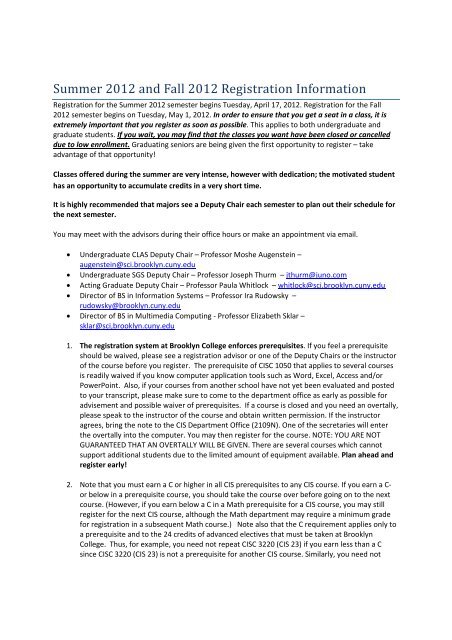
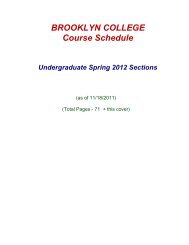

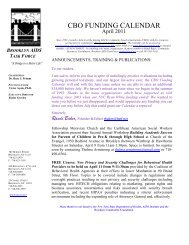
![PHIL 3314: Moral Issues in Business [Lindsay] - Brooklyn College ...](https://img.yumpu.com/12442928/1/190x245/phil-3314-moral-issues-in-business-lindsay-brooklyn-college-.jpg?quality=85)
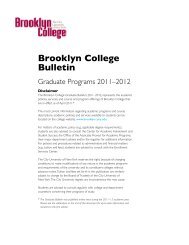

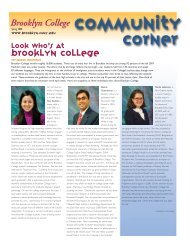

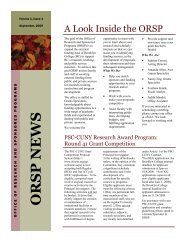

![CORC 3306: Scientific Revolutions [Menser] - Brooklyn College ...](https://img.yumpu.com/5776630/1/190x245/corc-3306-scientific-revolutions-menser-brooklyn-college-.jpg?quality=85)
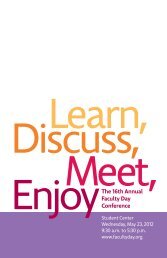
![PHIL 3309: Environmental Ethics [Menser] - Brooklyn College - CUNY](https://img.yumpu.com/5776371/1/190x245/phil-3309-environmental-ethics-menser-brooklyn-college-cuny.jpg?quality=85)
